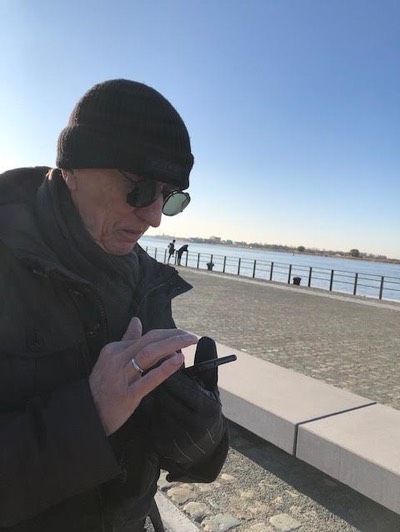Without a sense of God there is no love
Atheists have thought deeply, but not deeply enough. Agnostics have thought for a long time, but they keep kicking on the spot. Most people don't think or they have too much on their mind in order to survive. A minority know that God is the Creator, who has revealed His commandments to mankind and expects us to perfect the world until the Kingdom of God comes into being.
God is not a matter of faith. Evidence should not and cannot be sought. When two people love each other, they do not need proof that one truly loves the other. In the case of love, seeking proof is simply suspicion. In love it is enough to listen to the inner voice. That voice offers certainty. That's the way it is with God. The very fact that there is a beautiful world, that there is so much goodness between people, and that goodness is usually possible, makes it obvious that there is a God of Love who loves the human being. One who is suspicious never knows what love is, nor the love of another person, nor the love of the Supreme Being.
Why do people so often shout "Oh my God”? (*)

In the countless videos made during the 9/11 attacks, you can hear people shouting "Oh my God" all the time. You always hear this at terrible events, but also at wonderful, surprising or very happy moments. I do not know whether this also applies to countries where monotheisms do not play or have played a role in public life. In this article I want to analyze the statement "Oh my God" to answer the why and the purpose of this invocation of the Supreme Being. What is most striking is that in that statement people assume that they have a relationship with God. They don't just shout something meaningless.
It is a strange thing in itself that random people turn to God at certain momentous events. This also applies to people who are not religious at all and rarely or never think of God in their daily lives. These are events that affect people in such a way that they ask for help or support from a power outside them. This power lies beyond objective reality, for God is not objectively perceivable and is not present as an object or a being in the reality visible to us. The latter does not mean that there is no God. Maïmonides said about this: "The fish in the water do not know the fire. This does not mean that the fire does not exist ". The fish are the people in the objective world. The fire stands for what is above that objective world, on the other side, above nature.
The invocation "Oh my God" can also be a thanksgiving, as if some supernatural power is causing the event. God is such a supernatural being. Man turns to a supernatural being because there is something at work that is beyond his control. "Oh my God" is a reference to that which is beyond the objective world. In philosophical terms: to that beyond-of-Being.
We could conclude from this that in the above events man is so moved that he suddenly realizes that he has a relationship with God, that he is a creature of God, that he is dependent on God. In his innermost, man realizes that he is in relation to God. If this is correct, then we must ask ourselves what God expects of us in that relationship.
What could God expect from us? Man and the world are His creation. It makes sense, therefore, that God cares about it. According to the monotheisms, God has revealed what He expects of us. It is now up to man to realize the Kingdom of God in the world. This is the so-called Redemption. If we fail to do so, the Flood will follow and the history of the Tower of Babel is repeating itself. Climate change is figuratively and literally triggering the Flood. Greed, materialism, consumerism, globalization and the multiculturalism that accompanies it, are leading to the Tower of Babel ending in chaos until every people return to their own land. The pandemic now ravaging the entire world would not have been possible without globalization. The pandemic is a wake-up call for Babylonian conditions, given the political, economic and social consequences.
If in these developments towards the Flood and Babel we will call upon God, it means neither more nor less that we expect salvation not from political action but from God. Here we recall Heidegger's statement at the end of his life: "Only God can save us." After the horrors of National Socialism, in which Heidegger himself had believed for a short time, he had to come to that conclusion.
There is a real chance that the effects of climate change and the plagues that get across humanity will lead to a war of all against all, in civil wars as well as wars between countries and continents. As has usually been the case in the course of history, politics will not be able to prevent this disaster. Only God offers hope, because God expects us to love our neighbors (that leads to the Kingdom of God). It is likely that God will support us in this, provided we seek His help. The latter is precisely what is meant by prayer.
God cares about His creation, about man and the world. Man's task is to perfect himself and the world, that is to say, to realize the Kingdom of God. God is dependent on man for this. Man can delay or even prevent the realization of the Kingdom of God. To succeed, man can call upon God, which is the same as praying. This is not about individual prayer, but about mankind who must turn to God for assistance in the realization of the Kingdom of God. The Kingdom of God is not only meant for me alone. In that Kingdom we are connected with each other. When one suffers, it affects the entire community.
We could not mention God at all. An atheist and an agnostic might say it is about achieving peace, well-being and prosperity around the world. We don't need religion for that. Humanism is enough. That is an honorable position. Still, I have my doubts. Can we survive without a force above nature? Isn't the history of thousands of years sufficient proof that man cannot do without God to bring love, justice and peace to the earth? In addition to knowledge, is not the wisdom of Revelation also necessary?
In order to understand how God would answer us (in our prayer to Him to save us from the terrible disaster that is already occurring and which can take on different and more serious forms in the 21st century), awareness is necessary of what God expect. The answer is simple, for that is the core message of Revelation: "Love your neighbors as yourself." Prayer must therefore help us to love our neighbors because that is the only way to Salvation, as intended by the Creator.
Loving one's neighbor is not a pious wish. It is about justice, fair distribution of wealth, service, sacrifice. It is an economy that is meant to end poverty and misery, rather than an economy for self-enrichment. It is about a policy of bringing peace, well-being and prosperity to the country and not a struggle between opponents or to corruptly enrich oneself.
To conclude, a question remains: if political action cannot mean salvation, what must be done to make the 21st century the best century ever thanks to the realization of the Kingdom of God and to prevent a man-made Apocalypse takes place? "Only God can save us" in the light of the above means that charity must conquer. Starting with the one closest to us and then it continues like an oil slick. During the Flood, it was Noah who went into the ark with his family, as well as a pair of each animal. Now that the new Flood has been set in motion, we must once again focus on family life, clearly distinguish the masculine from the feminine and above all, be faithful to each other in the marriage relationship. From there charity goes to the relatives, the fatherland to the solidarity between the countries. One consequence of this is that everyone returns to the country where they belong and there brings love to the people. "Honor your father and your mother" is one of the commandments of Revelation: How can one honor one's father and mother if one leaves for years or definitely to another land? The same is true of our relatives and fellow countrymen.
According to Rosenzweig, there are people who want to speed up the realization of the Kingdom of God. Those are the fanatics and the sectarian believers. With them it is not about charity, but about intervention in God's name. The result of this is that the Kingdom of God is further away. It is not God who will realize the Kingdom of God, but that is the vocation of man. A calling that can be fulfilled only through charity.
We can only pray to God for His help so that all people will follow their vocation. Will there soon be a movement that affects masses of people and urges them to take responsibility for the family, the relatives, the relatives in the country of origin, the compatriots and ultimately for the world? Then there is hope for the people now living in extreme poverty, for the oppressed, and the world will remain habitable for future generations.
We will say "Oh my God" when suddenly hundreds of millions of people return to the land of their ancestors and revolutionize it for the better. This moment is imminent, will be totally unexpected and will start spontaneously. It cannot be that God has forsaken us.
(*) This article is strongly inspired by the philosophy of Franz Rosenzweig (1886-1929), but is my personal interpretation of it. The main work of Rosenzweg "Der Stern der Erlösing" is considered one of the most difficult philosophical books.
A spiritual renaissance
Materialism and greed are the basis of international politics, trade agreements, globalization, multicultural society and the European Union. This one-sidedness means that there will be no solution to the great challenges facing us in the 21st century.
The effects of climate change, pandemics, national and international polarization and mass immigration require a spiritual renaissance. In Europe's spiritual renaissance, the priority will once again be placed on Judeo-Christian ethics.
Are you a Christian? I think that is a pointless question. My point is that you are faithful in love, that you do not steal, that you do not lie, that you do not spread fake news and do not slander, that you do not exploit people and ensure that people living in deep poverty do not go hungry and that you can live in a dignified way, that you treat all people equally, that you treat the environment carefully and responsibly, among other things out of love for future generations, and so on. It is a fact that these rules "coincidentally" correspond to the commandments at the heart of Judaism and Christianity.
If we want to initiate the spiritual renaissance, the children must first and foremost be inspired by the example of the adults during their upbringing. I have written many times that the goal of education is "for the child to become a good person" (strangely, no one has picked up on this yet). The schools that consistently propagate Judeo-Christian ethics will form the elite of tomorrow. Equally important, of course, is a politics, an economy and a social policy where managers, together with all citizens, take this ethics as an explicit measure of their actions and aspirations.
We must do everything we can to maintain and, if necessary, restore our European identity. When I see how in Islamic countries, for example, women are considered inferior beings and live more or less in a prison, then that is at odds with my values. There they can live as they want, but I do not wish these people in my "home", this is my country. As a white woman if you walk in a neighborhood with many Muslims, you are treated like prey. I don't want that.
If you look at how nature is treated in Asia, then this does not correspond to my values. They may live there in their own filth, but I don't want anything to do with it.
In short, I advocate an Europe where only people live who adhere to Jewish, Christian and humanist values and who live accordingly. I think this is becoming more and more necessary given the challenges we now face and which await us in this 21st century. Such an Europe that I envision will have the strength to show solidarity with other countries. The Islamic countries and black Africa can count on us, but the key to the humanization of these countries lies in the return of all immigrants to their countries of origin. There they can build up those countries with solidarity from Europe and they can realize a more humane society. The multicultural society, on the other hand, will create such internal tensions that Europe in this century will become a center of aggression and hatred, without regard for other countries.

A third and fourth wave of the corona pandemic and new pandemics will not be enough to kick-start a spiritual renaissance. Other disasters will come our way. Then the people will rise and we, white Europeans, will take back control to restore our fundamental values in our countries.
Civilization doesn’t need religion
The world needs a new spirituality to reach a higher level of civilization. According to Franz Rosenzweig, Islam does not give the right answer. This is a religion with an almighty God commanding what man should obey. In this sense, Islam is a continuation of paganism, in which the fetishes and idols have been replaced by the one god Allah. Islam has not understood true revelation. The Muslim must submit and God absolutely does not ask us to do that, on the contrary we must be free to really serve God.
According to Judaism and Christianity, Revelation is a dialogue between man, the world and God. Man is fundamentally free. He wants to be a good steward of the world because the world was created for him. Man loves his neighbors to bring the love of God into the world.
In a sense, we don't need religion in a higher form of civilization. Wars were and are constantly being waged in the name of religion. This is at odds with the revealed truth. The more dogmatic the religion, the more fanatical the adepts and the more chance of cruelty, hatred, persecution, war. If we truly want to serve God, we as rational beings must take good care of creation and love our neighbors selflessly and unconditionally. God did not create religion, but man and the world. How we interact with each other and the world determines how we further perfect God's creation
more in the following texts:
- Will there be a repeat of the ten plagues of Egypt in the 21st century?
- Saint Zelensky and Putin the Satan
- War in Ukraine: the beginning of World War III
- Fear
- The 21st century: A spiritual era
- A laboratory virus does not disappear spontaneously
- Wind farms: immoral use of technology
- The perversity of power in non-western countries
- Talibans hope to conquer Europe
- Why was the Taliban able to defeat the West?
- The era of the good life
- Covid-19 and democracy
- A politics for the 21st century
- The Covid-19 Pandemic as Part of God 's plan (March 28, 2021)
- Covid-19 cannot be controlled
- The Lebanization of Europe |
- Living Under the Threat of the Apocalypse
- Asymmetrical ethics
- The ultimate salvation of Europe is in Russia
- A superior civilization
- The untold cruelty in black Africa
- How Trump can save democracy
- How to tackle the corona pandemic?
- The meaning and purpose of the corona pandemic
- The End of Times is human-made
- Russia will save European civilization
- The next war is coming, for sure
- Black Lives Matter is a satanic movement
- Europe will be the new Middle East and Russia will prevail
- How to cope with the challenges of the 21st century?
- The imperative mutation of humans: the 4th Superpower
- If Europe retains its identity, there will be world peace
- Climate change: The army must commit a coup
- Climate crisis
- The foundations of the European civilization
- Israel and Europe: a beacon of peace and prosperity for the world
- The war is coming, that’s for sure
- A Muslim-free Europe
- Tribute to the white race
- All races are equal
- Who are the people of goodwill?
- The influence of climate change on human behavior
- Climate change is a metaphysical problem
- 氣候變化是一個形而上學的問題
- Income inequality leads to violence
- The need for a coup in Europe
- Production of electric cars and wind turbines is disastrous for the environment
- A new Garden of Eden in the 21st century
- apocalyps now
- How to preserve European civilization?
- A spiritual renaissance
- Back to normal, natural life
- The Religious Solution to the Judeo-Palestinian Conflict
- Rich people don't belong in a Judeo-Christian civilization
- Third World War or Third World Peace
